Wednesday, February 26, 2025
Monday, February 24, 2025
Legacy Family Tree Webinars
This is a reminder about a FREE educational resource that we could all be using. Legacy webinars can be viewed in real time by registering at https://familytreewebinars.com/ Each webinar is free for viewing for one week after the original presentation. You can also subscribe to the webinars for access to the entire catalog of classes. Here are a few of the most recent topics that are still available.
Sunday, February 16, 2025
Heirlooms Roundtable
Following Diane's slides showing many of the treasures that had been collected from their family home, members shared examples of heirlooms handed down or created in their families.
There were several shadow boxes, including Diane's creations.
Mary's included a photo of her father; she also had a Winterbottom mug from 1855 and her grandfather's British war medals.
Martha had one for Dan's grandmother with sewing memorabilia (she also has her sewing machine). Her mother's shadow box incorporated pins, handkerchiefs, etc.
Nancy shared a photo of a 1912 grain wagon that is located on the family farm where they hold reunions.
Dennis has tools handed down from his great grandfather, a shipwright who worked on Dewey's flagship. He even used the old plane recently!
Annie had several Norwegian pamphlets that were used by her 2nd great grandfather's family for worship purposes after they arrived in Wisconsin in the 1850s. Lars Rowe's signature appears on the covers of those books.
John and Royal both described 4-generation photos that were important to their family histories. John mentioned in particular the span of years included in his photos. One of Royal's photos was a picture postcard from 1912.
Roger shared the importance of Korean War memorabilia for his family.
Maureen showed doilies that were made by her husband's grandmother.
Thanks to everyone who participated in the roundtable!
Saturday, February 15, 2025
Family Heirlooms
This week we shared family heirlooms during a roundtable that followed Diane's presentation. The first thing we learned was that we are curators, creators, caretakers--or perhaps all three! Diane suggested a few things we need to think about as we contemplate items that have been passed down in our families or that we have created ourselves.
Diane provided two cataloging forms: one for artifacts and the other for photographs. She used the forms while going through hundreds of items in the family home after her father moved to town. She had pictures of many or those items, including the famous family squirrel! Thanks, Diane, for researching methods we can use to maintain our own family keepsakes.
Thursday, February 13, 2025
Family Search Center Update
Sadly, we learned Wednesday that the LDS church will begin a remodeling project next week. This means that the Family Search Center will close for the immediate future. They "hope that we will visit them next year."
Evidently the center's director was not informed of these plans until this week! It looks as if they may be open this Saturday, February 15, if anyone wishes to visit before they close for the rest of this season.
Tuesday, February 11, 2025
Friday, February 7, 2025
February 4 Workshop
This week we focused on military records. Annie covered how to determine whether an ancestor served in the military and what types of records are available. She also provided addresses for several military websites and suggested using the Wiki for further information.
Maureen followed with an excellent tutorial on using the Fold3 website. Fold3 is a subscription site but has many free "publications," as they call their collections. You can look for a surname and filter with time period, military conflict and location. Fold3 offers a 7-day free trial and occasionally provides free access, particularly around military holidays.
Monday, February 3, 2025
Volunteer at the National Archives
Can you read cursive?? Visit the Citizen Archivist program at the National Archives to volunteer.
Every year, the National Archives digitizes tens of millions of records. The agency uses artificial intelligence and a technology known as optical character recognition to extract text from historical documents. But these methods don’t always work, and they aren’t always accurate.
That’s where human volunteers come in. By transcribing digital pages, volunteers make it easier for scholars, genealogists and curious history buffs to find and read historical documents.
The National Archives is brimming with historical documents written in cursive, including some that date back more than 200 years. But these texts can be difficult to read and understand— particularly for Americans who never learned cursive in school.
That’s why the National Archives is looking for volunteers who can help transcribe and organize its many handwritten records: The goal of the Citizen Archivist program is to help “unlock history” by making digital documents more accessible, according to the project’s website.









